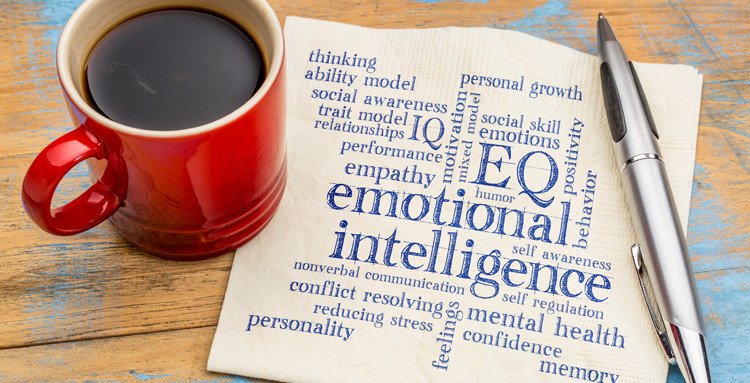Menu

The Business Case for Developing our Emotional Intelligence
Do you recognise the emotion you are feeling? Can you manage your feelings without allowing them to swamp you? Can you motivate yourself to get tasks completed? Do you sense the emotions of others and respond effectively?
If you answered yes to one or more of these questions, it is likely that you have developed some of the skills that form the basis of emotional intelligence.
The term ‘Emotional Intelligence’ (often written as EI or EQ) was first used by psychologists Mayer and Salovey (1990) and refers to a person’s capacity to perceive, process and regulate emotional information accurately and effectively, both within themself and in others, and to use this information to guide their own thinking and actions and to influence those of others.
As the workplace evolves, so too does the body of research supporting that individuals with higher EQ are better equipped to thrive and succeed, deliver results with and through others, deal with change more effectively, and manage stress.
Daniel Goleman (1995) recognised five distinct categories of skills which form the key characteristics of EQ and proposed that, unlike IQ (intelligence quotient) these skills can be learned where underdeveloped and improved upon.
There are several models of EQ based around key areas, some with slightly different labels.
Models include such elements as: –
- Self-awareness: the ability to recognize and understand one’s own emotions and their impact on others. Self-awareness is the first step toward introspective self-evaluation and enables one to identify behavioural and emotional aspects of our psychological makeup which we can then target for change. Emotional self-awareness is also about recognizing what motivates you and, in turn, what brings you fulfilment.
- Self-regulation: the ability to manage one’s negative or disruptive emotions, and to adapt to changes in circumstance. Those who are skilled in self-regulation excel in managing conflict, adapt well to change and are more likely to take responsibility.
- Motivation: the ability to self-motivate, with a focus on achieving internal (intrinsic) motivation as opposed to external praise or reward. Individuals who can motivate themselves in this way tend to be more committed and goal focused.
- Empathy: the ability to recognise and understand how others are feeling and consider those feelings before responding in social situations. Empathy is not the same as sympathy. It allows an individual to understand the dynamics that influence relationships, both personal and in the workplace.
- Social skills: the ability to manage the emotions of others through emotional understanding and using this to build rapport and connect with people through skills such as active listening, verbal, and nonverbal communication.
Emotional Intelligence has been described as the ‘delivery system’ for IQ.
EQ facilitates our capacity for resilience, motivation, empathy, reasoning, stress management, communication, and our ability to read and navigate social situations and conflicts. Whilst IQ gets you so far in your career, it’s Emotional Intelligence that keeps you there and going further.
And now is a time more than any other time when we need leaders to use their EQ, to meet people where they are and understand their concerns, to enable them to stay adaptable and focused as our ways of working and the work itself changes.
People who use their Emotional Intelligence can manage their own impulses, communicate better, manage change better and build rapport and confidence. Research shows that clarity in thinking and composure in stressful and complex situations is where top performers shine in the workplace.
In addition to individual success there is an Innovation Premium driven by EQ. Organisations where leaders and their teams have developed their EQ, are much more likely than others to have cultural ingredients that spur innovation—high degrees of empowerment, clear decision rights, the right incentives, and tolerance for risk. They have also likely created the culture of psychological safety which allows for experimentation without blame or fear of mistakes.
In a recent article in Harvard Business Review “7 strategies to build a more resilient team”, four clear characteristics were mentioned for developing resilience.
These were: –
- Candour: Is your team able to have open, honest dialogue and feedback with each other? They do this respectfully in such a way as not to destroy relationships.
- Resourcefulness: When faced with challenges or problems, can your team pull together to build creative and effective solutions? They devote their energy to solutions not on blame and remain focused on outcomes regardless of external conditions.
- Compassion and Empathy: Do your team members care for each other and share both success and failure? Resilience is often expressed in deep commitment to “co-elevating” the team rather than seeking individual recognition or success.
- Humility: Can your team ask for and accept help from other team members? Resilient teams are willing to admit when a problem has become intractable and ask for help, either from someone else on the team or someone else in the organisation.
What each of these sets of characteristics have in common is their strong link to facets of Emotional Intelligence.
Further support for the Business Case for EQ comes from a paper from Harvard Business Review in 2019 entitled ‘The EI advantage’.
The paper states that Emotional intelligence is increasingly and urgently recognized as a competitive advantage for companies that want to cultivate a purpose-driven workforce for the future. Whether in the C-suite or on the front lines, emotionally intelligent employees are a critical force driving innovation and enhanced customer experiences that come from a strong culture of empowerment.
Emotional intelligence matters for motivation, and motivation matters for success. Whether it is in relation to work, personal goals or health, developing our emotional intelligence enables us to understand the deeper meaning of our aspirations and the self-motivation skills required to achieve them. Goleman (1995) identified four elements that make up motivation: our personal drive to improve, our commitment to the goals we set for ourselves, our readiness to act on opportunities that present themselves to us and our resilience.
While self-motivation is central to achieving our goals, emotionally intelligent leaders within a business can also impact employee motivation. The capacity to recognise the emotions and, in turn, the concerns of others is an invaluable skill to have at your disposal in terms of realising the most effective ways to motivate teams and individuals.
Whilst many companies understand the benefits of having employees with strong EQ, many fail to leverage it in any way. This does not have to be the case.
Over 40 years of Neuroscience research on Brain Plasticity (neuroplasticity) confirms our lifelong capacity to develop new ways of thinking. The traits encompassed by EQ are developable with deliberate practice and coaching.
So how does developing EQ work?
It starts with increasing our self-awareness. While it is commonly accepted that we are often driven by emotions, we do have the capacity for self-management and self-regulation of such emotions; the ability to manage our thinking and to some extent control our responses to situations. We do this work with our coaching clients through increasing their awareness of themselves and helping them to ‘reframe’ the thinking which drives their emotions.
Self-regulation builds on self-awareness and is an integral part of becoming emotionally intelligent (Goleman, 1995). Self-management builds on this further and allows an individual to use knowledge about their emotions to better manage them.
Indeed, leaders with an aptitude for self-regulation are far less likely to be aggressively confrontational and make snap decisions.
This is not to deny or negate negative emotions as their emergence is always a useful indicator of something we need to pay attention to. In instances of negative emotions such as anger, developing your EQ can help identify what you are feeling and determine the cause of the emotion through reflection and self-analysis allowing you to respond in a rational manner.
OrgShakers can support individuals and organisations to develop their EQ.
We use well respected measures such as the EQ-i to assess an individual’s current levels of development for the traits which encompass EQ (we all have strengths and areas for development within EQ), we provide a detailed individual report and build action plans for the development areas. Our experienced Executive Coaches then work with individuals on their development. This is done through working on mindset and behavioural changes as well as action plans to help these changes stick.

EQ can be developed and refined over time with the condition – just like any skill – that it is given the necessary focus and effort to do so. Many would argue that the ability to connect with and understand others is a more powerful skill to possess than cognitive intellect alone.
Emotional Intelligence is not about being ‘nice’, or a ‘nice to have’ but is a personal; and business imperative.
In the words of American civil rights activist, Maya Angelou:
“I’ve learned that people will forget what you said, people will forget what you did, but people will never forget how you made them feel.”
Copyright OrgShakers: The global HR consultancy for workplace transformation founded by David Fairhurst in 2020



